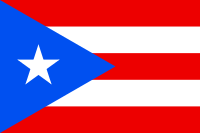June 12, 2017 •
Puerto Ricans Vote on Issue of Statehood
Puerto Ricans went to the polls Sunday to vote on whether Puerto Rico should become America’s 51st state. Voters chose between remaining a commonwealth, becoming a state, or gaining sovereignty with an official affiliation with the United States. Critics viewed […]
 Puerto Ricans went to the polls Sunday to vote on whether Puerto Rico should become America’s 51st state. Voters chose between remaining a commonwealth, becoming a state, or gaining sovereignty with an official affiliation with the United States.
Puerto Ricans went to the polls Sunday to vote on whether Puerto Rico should become America’s 51st state. Voters chose between remaining a commonwealth, becoming a state, or gaining sovereignty with an official affiliation with the United States.
Critics viewed the election as flawed, arguing the ballot language was skewed to favor the pro-statehood New Progressive Party. Ninety-seven percent of ballots cast were in favor of statehood.
However, on an island averaging roughly 80 percent voter turnout, only 23 percent of registered voters participated in Sunday’s election.
Nevertheless, Gov. Ricardo Rosselló plans to take the referendum results to Washington, D.C. and speak with Congress, the White House, and various agencies regarding admitting Puerto Rico to the union.
March 2, 2017 •
Puerto Rican Governor Approve June Referendum
This month, Gov. Ricardo Rosello approved a nonbinding referendum to determine whether Puerto Rico will continue free association or seek statehood or independence. The referendum will be held on June 11, 2017, and will give voters the choice between statehood […]
 This month, Gov. Ricardo Rosello approved a nonbinding referendum to determine whether Puerto Rico will continue free association or seek statehood or independence.
This month, Gov. Ricardo Rosello approved a nonbinding referendum to determine whether Puerto Rico will continue free association or seek statehood or independence.
The referendum will be held on June 11, 2017, and will give voters the choice between statehood and independence/free association. Previous referendums and plebiscites have given independence and free association as separate options, but the upcoming referendum lumps them together.
If a majority chooses independence/free association, a second referendum will be held in October to determine the preference between those options. If the referendum passes in favor of statehood, Puerto Rico, currently facing $70 billion in public debt, would have access to more federal funding if ultimately approved by the U.S. Congress as the 51st state.
Currently, Puerto Ricans are U.S. citizens but cannot vote in presidential elections and have limited representation in Congress.
State and Federal Communications, Inc. provides research and consulting services for government relations professionals on lobbying laws, procurement lobbying laws, political contribution laws in the United States and Canada. Learn more by visiting stateandfed.com.


